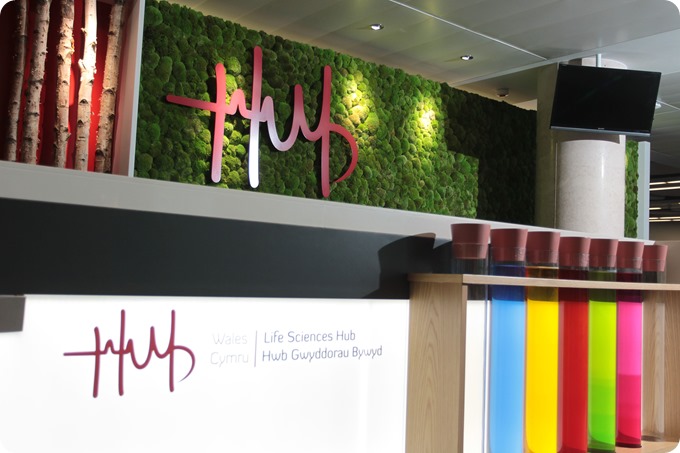Life sciences is one of the Welsh Government’s nine priority sectors for the economy, in which it is supporting industry-led investment.
LSHW Facilities English
The Life Sciences Hub Wales, in Cardiff, was opened in July 2014 with the aim of increasing the sector’s contribution to the Welsh economy by more than £1 billion by 2022.
It is the focal point of the sector in Wales, bringing together the worlds of academia, business, clinical and professional services and funding organisations to create a melting pot of talent and creativity that drives innovation.
Its work encompasses all sector activities, from funding to business support to international development and promotion.
Its partnership model provides access to significant levels of funding and other support streams to help businesses grow and prosper.
There are now more than 140 member organisations representing the public and private sectors.

How has the life sciences sector in Wales developed over recent years?
Life sciences is one of Wales’ fastest growing and most innovative industries.
It employs over 11,000 people in more than 350 companies and is worth around £2 billion to the Welsh economy every year.
The Hub’s partnership model has provided access to significant levels of funding and other support streams to help new businesses grow and prosper.
Recently the Hub has started a greater engagement with NHS Wales and the healthcare sector more generally to meet the Welsh Government’s drive to improve the nation’s health and economic growth.
Thanks to the sector’s incredible success, Wales is now at the forefront of a number of exciting and pioneering developments across various fields, from pharmaceutical to biotechnology.
In what ways do you think Brexit will impact life sciences in Wales?
At this early stage we simply don’t know how Brexit will affect the sector in Wales.
Reassuring moves from the UK government have alleviated some of our initial concerns about the impact of Brexit.
We were pleased when Prime Minister Theresa May outlined an ambitious, more interventionist Industrial Strategy last November. This strategy contained a pledge to boost research and development spending by £4.7bn (€5.4bn) between now and 2020.
In January the PM published a green paper setting out more details of her strategy, which included a pledge that life sciences R&D would be a key part of Britain’s post-Brexit economic plan.
The paper also revealed that leading immunologist Sir John Bell has offered to lead work on a new strategy to make the UK the best place in the world to invest in life sciences.
What changes have you seen so far?
We are fortunate in that we have not yet seen any significant changes as a result of Brexit.
Of course, in the immediate aftermath of the referendum result there was a lot of concern and uncertainty about the future, but thankfully there were no ‘knee jerk’ reactions that could have caused damage in the sector.
Thanks to the Prime Minister’s announcements I mentioned previously there is now less concern and a bit more certainty about the direction of travel.
What challenges do you see on the horizon?
The main concern for life sciences in the UK is the role the country will take in future regulation, especially in healthcare. The UK has traditionally played an important role in structuring the regulatory frameworks that govern the safety of medicines and medical devices across the EU.
If the UK is not a part of that process in future it could have a detrimental effect for the industry in general and on patient safety specifically. The biggest risk is if the regulatory systems diverge as we leave the single market, and parallel systems emerge.
That would cause added cost and complexity and potentially hinder the process of new drugs and treatments reaching patients in the UK.
Another risk is the future of collaboration. Horizon 2020, the €EU’s largest ever research and innovation programme, is an example of a successful scientific collaborative programme. The current phase of the programme is providing an estimated 80 billion of funding, giving grants to research and innovation projects and offering valuable coaching and mentoring to SMEs.
The UK could still continue on the next phase of Horizon through an association agreement, but ideally we would want to be leading and directing programmes such as these.
Looking positively, I believe that as long as the UK life sciences sector continues to have a strongly funded research base and a workforce with strong scientific skills and expertise, other countries will want to collaborate with us.
How will the Hub try to overcome these issues?
Ultimately many of the wider political decisions that might affect the sector are out of our control, so we have to focus on making life sciences businesses in Wales as resilient as possible to any future change.
For example, we recently appointed our first ever entrepreneur in residence to help take life sciences businesses to the next level.
The newly created role has a business development rather than a science focus. Startup and early stage companies will be offered a dedicated programme of support to help them develop business plans and gain investment to ultimately progress their business.
And of course we will strengthen our partnerships and continue our mission to connect, inspire and accelerate.
Will the Hub continue to forge international partnerships?
Absolutely. This has always been key for us anyway, but Brexit means it is more important than ever for us to reach out beyond our borders to make new partnerships that will benefit the life sciences sector in Wales.
We are working hard to strengthen our current collaborative arrangements and working partnerships while actively working to create new ones.
For example, last summer we signed an important international partnership agreement with four other science parks and clusters across Europe and North America - LifeTechValley in Belgium, Sherbrooke Innopole in Quebec, Canada, Medicon Village in Sweden and Inartis Foundation/Health Valley in Switzerland.
The agreement, called TIM (Twins’ International MultiHelix), will be invaluable to each organization’s members. Not only will it help them with investments and strengthen their work in an international setting, but it will also open opportunities for an international exchange of knowledge, with students and speakers crossing borders to learn and share their expertise.
We had already ‘twinned’ with Medicon Village and signed a memorandum of understanding with Sherbrooke Innopole, but the new agreement will strengthen and expand on those relationships, allowing the Hub’s members to network in a wider international arena.
The Hub is also a member of the Council of European BioRegions (CEBR), a member-driven network of life sciences clusters across Europe.
The network currently has 40 European members and hundreds of partner clusters across the world.
For us, it’s most important aim is to create a profile for European clusters on the world stage, something that will become even more valuable for its UK members post-Brexit.
We are also looking forward to the work of CALIN, the new Ireland-Wales life sciences network.
CALIN (which stands for Celtic Advanced Life Science Innovation Network), was launched last year with €11.96m of EU funding. It aims to connect SMEs with world-leading HE institutions including Bangor, Cardiff and Swansea Universities in Wales, and University College Dublin, The National University of Ireland Galway and Tyndall National Institute, University College Cork in Ireland.
CALIN will focus on cutting edge areas including precisions medicine, regenerative medicine and bio-compatibility, and hopes to engage and assist over 240 SMEs throughout Wales and Ireland.
The Hub is also a proud supporter of BioWales, the Welsh Government’s flagship event for the life sciences sector. This year’s event is being held at Cardiff’s Millennium Centre on 7 and 8 March, and up to 700 delegates from across the world are expected to attend to hear from leading figures from companies including GSK, Pfizer, GE Healthcare and Microsoft.
This year’s event has a Health and Wealth theme focuses on the latest developments in cell therapy, regenerative medicine and medical technologies, in which Wales is particularly strong.
This year’s event will be an important opportunity to confirm that Wales is still open to the world.
What do you think the future holds for life sciences in Wales and the UK?
I think the future is positive. Life sciences by its very nature is a collaborative and forward-looking sector, always ready to seek out and embrace new opportunities, and that sets it in good stead for the future.
Nationally, the Prime Minister’s commitments bode well for the future and in Wales, the Welsh Government’s continued commitment to the sector is also reassuring.
What is Life Sciences Hub Wales’ vision?
Our vision is to connect, inspire and accelerate. We aim to be the nerve centre of a vibrant and prosperous Welsh life sciences eco-system, bringing organisations together to provide a commercially-driven melting pot of talent.
Where can readers find more information?
Visit: https://www.lifescienceshubwales.com/
About Penny Owen
 Dr Penny Owen is the interim executive chair of the Life Sciences Hub Wales.
Dr Penny Owen is the interim executive chair of the Life Sciences Hub Wales.
She has more than 20 years’ experience of working in the life sciences sector, specifically in R&D, marketing and operations.